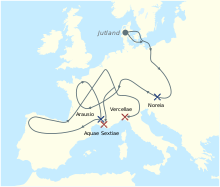
Back معركة فرشلة Arabic Битка при Верцела Bulgarian Batalla dels Camps Raudis Catalan Bitva u Vercell Czech Schlacht von Vercellae German Batalla de Vercelas Spanish Vercellaen taistelu Finnish Bataille de Verceil (101 av. J.-C.) French Batalla de Vercellae Galician Vercellaei csata Hungarian
| Battle of Vercellae | |||||||
|---|---|---|---|---|---|---|---|
| Part of the Cimbrian War and Roman–Germanic Wars | |||||||
 Giovanni Battista Tiepolo, The battle of Vercellae, from the Ca' Dolfin Tiepolos, 1725-1729 | |||||||
| |||||||
| Belligerents | |||||||
| Roman Republic | Cimbri | ||||||
| Commanders and leaders | |||||||
|
Gaius Marius Quintus Lutatius Catulus Lucius Cornelius Sulla |
Boiorix † Lugius † Claodicus (POW) Caesorix (POW) | ||||||
| Strength | |||||||
| 52,000–54,000 soldiers (legionaries and auxiliaries) | 120,000–180,000 warrior including 15,000 cavalry (400,000 including civilians) | ||||||
| Casualties and losses | |||||||
|
1,000 killed[1] 300 killed (Florus)[2] |
160,000 killed (Livy) 140,000 killed (Orosius) 60,000 captured 120,000 killed (Plutarch) 60,000 captured 100,000 killed or captured (Paterculus) 65,000 killed (Florus) | ||||||
Location within Italy | |||||||

 Roman victories.
Roman victories. Cimbri and Teutons victories.
Cimbri and Teutons victories.The Battle of Vercellae or Battle of the Raudine Plain was fought on 30 July 101 BC on a plain near Vercellae in Gallia Cisalpina (modern-day Northern Italy). A Celto-Germanic confederation under the command of the Cimbric king Boiorix was defeated by a Roman army under the joint command of the consul Gaius Marius and the proconsul Quintus Lutatius Catulus.[3] The battle marked the end of the Germanic threat to the Roman Republic.[4]
- ^ Lynda Telford, Sulla: A Dictator Reconsidered, p. 65.
- ^ Marc Hyden, Gaius Marius, p. 151; Florus, Epitome 1.38.14.
- ^ Chisholm, Hugh, ed. (1911). . Encyclopædia Britannica. Vol. 05 (11th ed.). Cambridge University Press. p. 545; para two, lines three and four.
2. Quintus Lutatius Catulus,..... In 101 the Cimbri were defeated on the Raudine plain, near Vercellae, by the united armies of Catulus and Marius.
- ^ Dawson, Edward. "Cimbri & Teutones". The History Files. Kessler Associates. Retrieved 18 May 2016.

